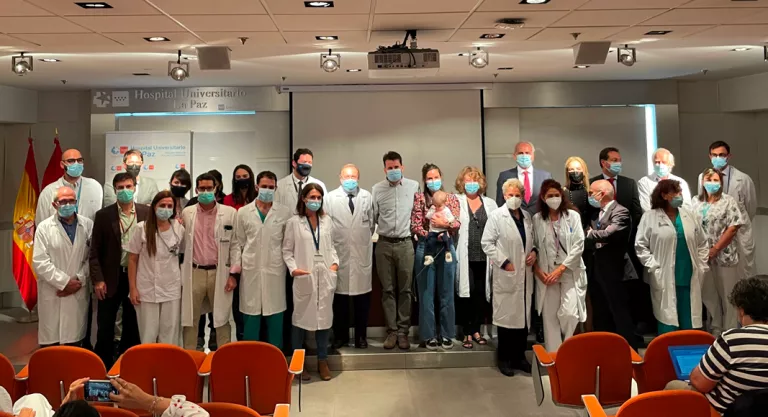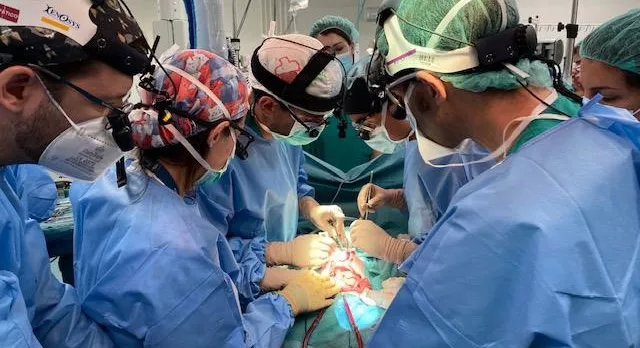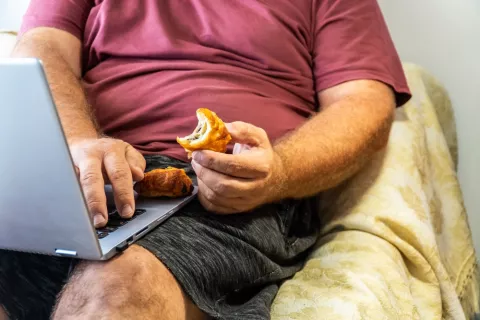
Hospital Universitario La Paz, a public health center in the Community of Madrid, has successfully carried out, for the first time in the world, an intestine transplant (in this case multivisceral) from an asystolic donor in a 13-month-old girl. the one who had been diagnosed with intestinal failure when she was only one month old, and whose health was very deteriorated. After receiving the medical discharge, the little girl is already with her parents at her home and she is fine.
The intestine is a lymphoid organ closely linked to the immune system and, under normal conditions, it is colonized by multiple germs, which is why rejection or infection occurs more frequently compared to other solid organ transplants. It is a technically very complex intervention and with the added difficulty of finding a suitable donor given the low weight that the recipients usually have.
In a multivisceral transplant –which was carried out in Spain for the first time in 2003– the digestive block formed by the liver, intestine, stomach, spleen and pancreas is usually implanted and constitutes the therapeutic option of choice when medical treatment is no longer possible, or reconstructive surgery.

Until now, the intestine from an asystolic donation had not been used because it was considered that the tissue would not be valid due to the special characteristics of this organ, but 30% of the patients who need this type of transplant die while in the waiting list, and as there was no scientific evidence to show that it could not be done, professionals from La Paz from the IdiPAZ Congenital Malformations and Transplant Group launched a three-year research project with institutional support and funding from the Mutua Madrileña Foundation, who have made it possible.
Until now, the intestine from an asystolic donation had not been used because it was considered that the tissue would not be valid due to the special characteristics of this organ.
This team of experts, made up of professionals from different hospital services, especially Pediatric Gastroenterology, Pediatric Surgery, Pediatric Cardiac Surgery, Pediatric Intensive Care, Anesthesiology and Resuscitation, as well as the Coordination of Transplants, Experimental Surgery and IdiPAZ, has achieved demonstrate that the intestine was valid in several experimental models and the results have been successfully transferred to the clinic.
What is non-heart beating donation, a growing practice
Non-heart beating donation currently accounts for a third of the donations made in Spain and consists of using organs and tissues for transplantation from a person whose death has been determined by a doctor after confirming that there has been an irreversible cessation of their cardiac and respiratory functions (absence of heartbeat and spontaneous breathing for more than five minutes). With this technique, donation is possible within end-of-life care in those patients in whom the adequacy of life support measures has been decided.

In addition, after certifying death, the donor’s organs can be preserved with perfusion of oxygenated blood through the Extracorporeal Membrane Oxygenation (ECMO) system, which prevents deterioration of the organ to be transplanted. It has been proven that controlled asystole donation obtains similar results to the classic donation in brain death and its use is also increasing in other countries in our environment.
This technique was used for the first time in La Paz in 2014 in adults, and in September 2021 in children, although the pediatric transplant team had already performed it before with the itinerant ECMO team in three centers (Madrid, the Basque Country and Andalusia). ), the first one in 2018. Since the beginning, this public hospital has performed 147 (12 pediatric) with organs from 64 donors, of which 57 were adults and 7 pediatric. Also in La Paz, the first cardiac tests derived from a donation of this type have recently been carried out: one in an adult patient and two pediatric patients, all of them with serious heart disease.
Hospital La Paz, leader in child transplants in Spain and Europe
Hospital La Paz is considered one of the best transplant centers for children in Spain and Europe. In our country it is the only one accredited to carry out all available children’s programs and the only one that carries out the intestinal and multivisceral. In addition to hematopoietic precursor and cornea transplants, 3,149 organs have been performed in La Paz, of which 1,754 have been in children.
The majority of patients with intestinal failure referred to La Paz from all over Spain achieve digestive autonomy thanks to intestinal rehabilitation, which includes the administration of parenteral and enteral nutrition, medical treatment and surgery. Although transplantation is the last resort, it is also the only one that can save the life of certain patients.
Currently, La Paz Hospital is one of the most active pediatric transplant centers in Europe and coordinates TransplantChild (made up of 40 centers from eleven countries), one of the 23 European Reference Networks (ERN) approved by the European Commission in compliance of the European Directive on patients’ rights in cross-border care.
The Minister of Health of the Community of Madrid, Enrique Ruiz Escudero, presented this advance today at a ceremony attended by the director of the National Transplant Organization (ONT), Beatriz Domínguez-Gil; the managing director of La Paz, Rafael Pérez-Santamarina; the general director of the Mutua Madrileña Foundation, Lorenzo Cooklin, as well as professionals from this hospital and its Health Research Institute (IdiPAZ). The girl’s parents and representatives of NUPA, the Spanish Association for the Help of Children, Adults and Families Affected by Intestinal Failure, Multivisceral Transplantation and Parenteral Nutrition, were also present.
Source: La Paz University Hospital
.














